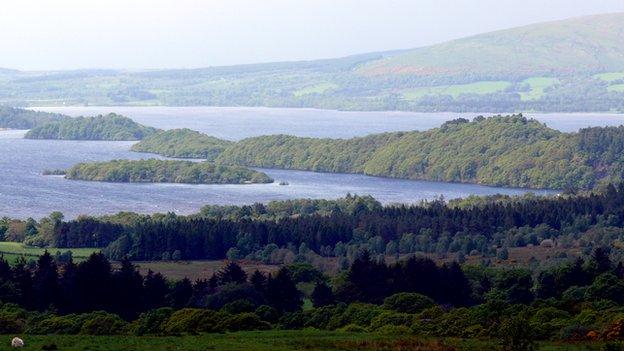Government approves national park camping by-law plan
- Published
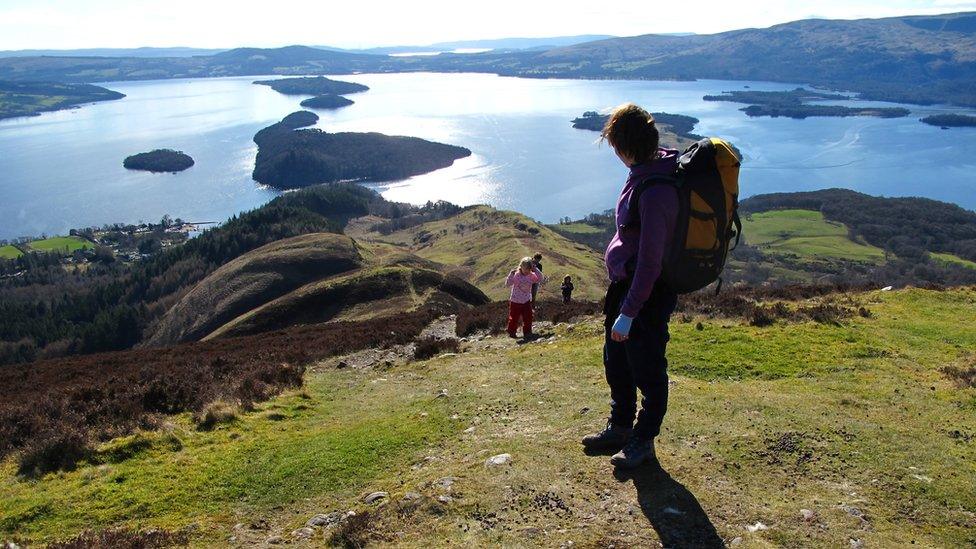
Campaigners are worried that the by-laws will damage access rights
Plans to restrict camping around several lochs in the Loch Lomond and the Trossachs National Park have been approved by the Scottish government.
New by-laws will "regulate" camping in three zones in the park - West Loch Lomond, Trossachs (West) and Trossachs (North).
The authority said the plans only affected 3.7% of the national park and included investment in new facilities.
But the by-laws have been criticised by many outdoor recreation groups.
Those opposed to the legislation, including Ramblers Scotland and the Mountaineering Council of Scotland, said they were concerned the laws would damage access rights.
The seasonal by-laws, which come into effect next year, will be active from 1 March to 30 September.
'Delicate balance'
They will cover much of the west side of Loch Lomond, the northern tip of Loch Long and many of the Trossachs lochs, including Loch Earn, Loch Venachar and Loch Lubnaig.
The national park convener Linda McKay said: "This is tremendously positive news for all those who, like us, want to protect and enhance some of Scotland's most precious natural places.
"These carefully-considered proposals reflect the views of a wide body of interests and demonstrate the delicate balance that needs to be struck when caring for our national parks."
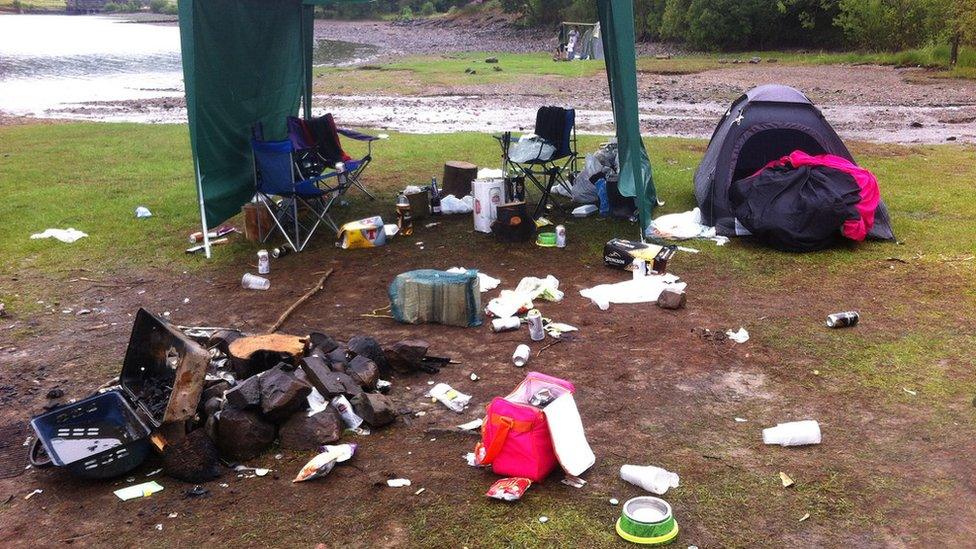
The park says the new by-laws are necessary to protect the natural environment
As part of the plans, 300 low-cost camping places will be introduced. Some of the sites will be new or improved camping facilities and in other areas permits will be issued which will allow "informal" lochshore camping at "sustainable levels".
The national park said the by-laws were necessary to tackle anti-social behaviour. They will also make it an offence to cause damage to the natural environment and prevent long-term encampments in lay-bys.
But some outdoor groups have greeted the Scottish government announcement with "disappointment".
'Sad day'
Kim Atkinson, chief executive officer of the Scottish Sports Association said: "Our Outdoors Pursuits Group (OPG) members have always acknowledged that there are significant problems arising from certain roadside camping activities which take place along loch shores within the national park.
"However, our OPG remains unconvinced that by-laws are the solution, and remains concerned that they will undermine Scotland's much-prized access legislation."
Jess Dolan, director of Ramblers Scotland, said the new by-laws would penalise the "vast majority" who camped responsibly.
She said: "This is a sad day for everyone who holds Scottish access rights dear. The national park itself has admitted that most of the anti-social problems arising from some camping activities are caused by a lack of infrastructure and enforcement of existing legislation.
"Therefore we are disappointed that the minister has decided to approve by-laws, albeit with a short delay before they come into effect."
Ms Dolan added that Ramblers Scotland would be working to ensure the legislation was not renewed when it comes up for review in three years' time.
And Dave Gibson, chief executive officer for the Mountaineering Council of Scotland, argued the national park and police already had the powers they needed to tackle lochside problems.
"We believe that an outcome of the by-laws will be that they will criminalise those who would otherwise wish to exercise their rights to wild camp responsibly under the terms of the Land Reform (Scotland) Act 2003," he said.
"As such, this decision goes against the rights to responsible access provided in the act."
However, the national park's plan has seen widespread support from residents of the park.
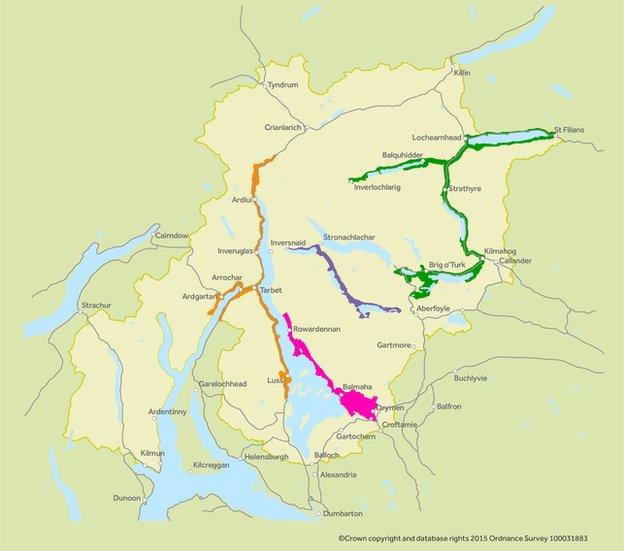
The by-laws will restrict camping around many of the lochs in the national park
Richard Graham, chairman of St Fillans Community Council, said: "This is great news, not only for the communities who have had to put up with environmental degradation and anti-social behaviour for years, but also for the visitors who have been put off spending time in these 'no go' zones.
"We've seen the restorative effect that dealing with the similar issues had on East Loch Lomond and look forward to seeing families, responsible campers and visitors return to areas like ours, which have been blighted by these problems for too long."
The new by-laws are rooted in a "Five Lochs" study, which originally looked at problems around Loch Venachar, Loch Lubnaig, Loch Earn, Loch Achray and Loch Voil.
The study followed an alcohol ban and restricted camping along parts of east Loch Lomond, introduced in 2011. The park said the by-laws had resulted in more families visiting the area and a reduction in anti-social behaviour.
The measures in place on east Loch Lomond will now see a "slight adjustment" to make them consistent with the new legislation.
- Published27 April 2015
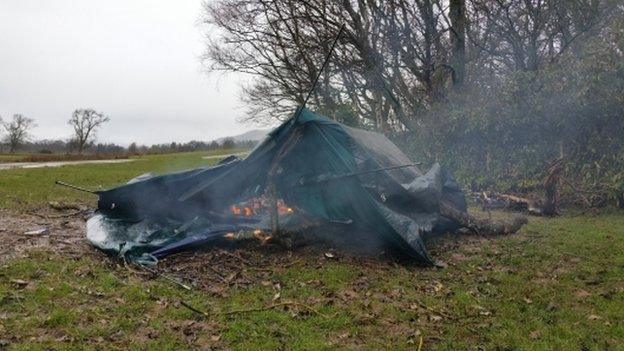
- Published13 January 2015
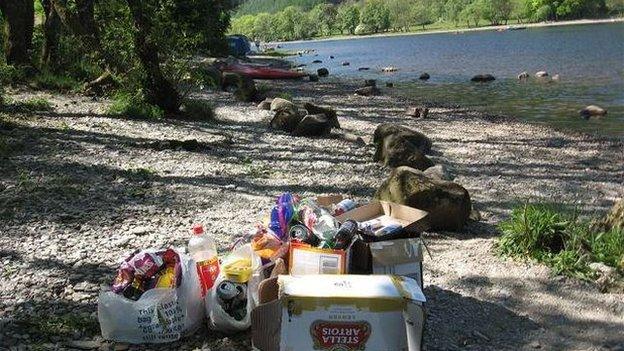
- Published6 October 2014
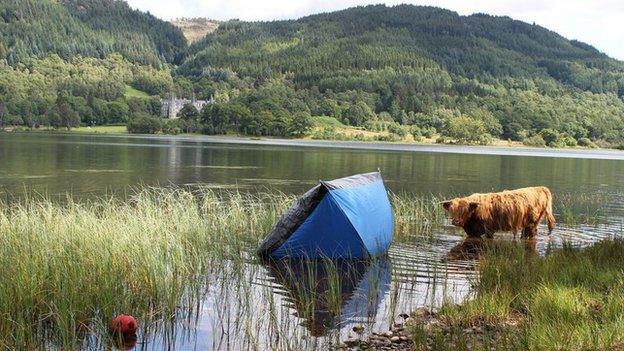
- Published2 October 2014
